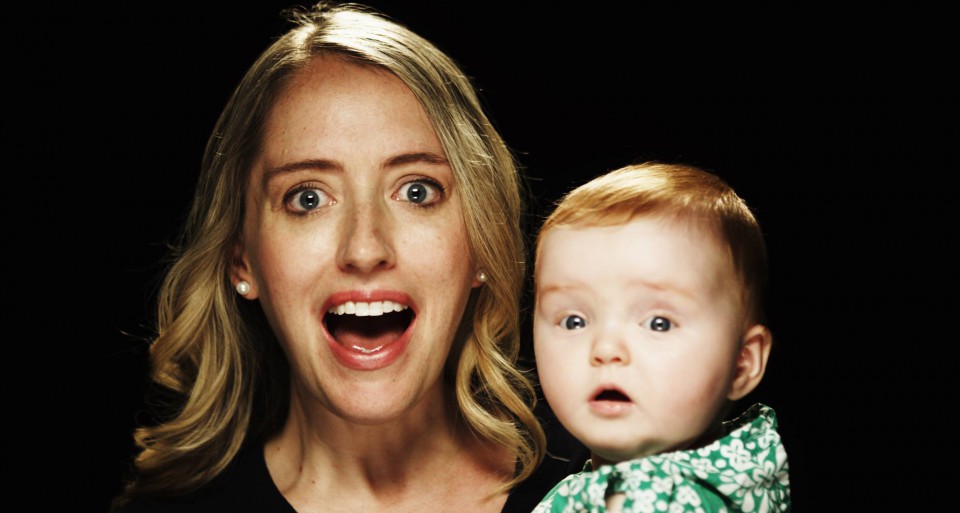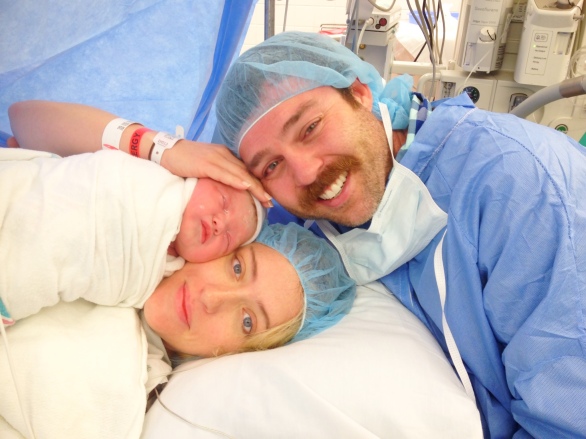I haven’t told anyone outside of my close circle of friends and family, but I think it’s important I share that I had postnatal depression. I want to clarify that I’m not talking about light baby blues – I’m talking about constant suicidal thoughts that required medical intervention. I know this is supposed to be a funny blog, but I needed to write this because a lot of moms I know don’t really talk about this. It’s not terribly funny or fun to chat about over coffee. It seems a little embarrassing and it belies the happy, fun, ridiculous photos you post on social media.
But I had postpartum depression and it was terrible. I want to explain the timeline of my depression – right after my baby was born, I was elated. I didn’t feel sad at all and actually recovered from my C-section quite quickly. Moira and I bonded almost immediately and I embraced and loved motherhood (I mean… for the most part I did. I also had moments of being terrified of this gigantic life change like everybody does.)
Then, at around 4 months after delivery, it hit me. Depression hit me like a giant storm of all-encompassing sadness. I was crying uncontrollably; I didn’t want to get out of bed or leave the apartment; and then something terrible happened – I became suicidal. Now, I’m not writing this for sympathy but to connect to people. Maybe somebody who is reading this is currently going through the same thing and I want you to know that it is normal, you are a good person, and there’s help out there.
Even when I was having suicidal thoughts – crazy thoughts that told me it would be better to slit my wrists with a razor than to take pills because I didn’t want to be found still alive and then have brain damage – even when I was having these insane thoughts – there was a little, quiet voice outside of my dominant, loud depression voice that told me, “You need help.” As I was lying awake on the sofa at 3 in the morning for the second day in a row without sleep, I knew I needed to talk to someone and fast. I didn’t want to actually die; I didn’t want to actually abandon my husband and my child but the depression was everything in that moment. It was stronger than any sadness I had ever felt before and it seemed like it would never end.
And so, I told my husband. I cried thinking I was the worst mother in the world and he listened and didn’t judge me – he accepted and he loved me. He immediately helped me find someone and we went that next morning to the doctor. Now, my doctor was out of town on vacation but every single person I talked to that morning wanted to help me – they found someone who could see me that morning. There is so much help out there for you. If you are feeling isolated and lonely and like nobody cares or understands what you are going through – there are people who want to help. If you are reading this and feel like there is no out other than ending your life, there’s somebody to talk to right now. There’s a free suicide prevention line that anyone can call – 1-800-273-8255. Please seek help. And almost every place in the country has free help for mothers suffering from postnatal depression. Please – listen to the smaller, quieter voice in your head and accept the kindness of others.
When I went to the doctor, she was lovely and she explained that a lot of women actually get postpartum depression 4-5 months after giving birth. I didn’t know this. I thought you got depressed right after delivery. Nope – many women get depression after their pregnancy hormones start changing, returning to pre-pregnancy levels. Those hormones are intense – and sometimes we need help. Since I’m being honest, I’ll let you know that I needed more than therapy, healthy eating and exercise. I needed drugs – capital “D” drugs. And, since I’m being honest, I’ll let you know that I was already in therapy, eating healthfully and exercising regularly. I think it’s dangerous for women to judge other women who have postnatal depression (I’m looking at you, Alicia Silverstone.) In The Kind Mama, Silverstone says that a whole host of prenatal and postnatal “problems” can be cured with a healthy, vegan lifestyle. Now, I am not judging her – whatever worked for her is awesome – but what I am judging is this inherent attitude that if you get postnatal depression, it’s because of something you did. I’m sorry, but when you are feeling so depressed that ending your life seems like the only rational option, the last thing you need to feel is guilty for another thing you didn‘t do.
I was healthy by all the standards. I had a great pregnancy. I was breastfeeding. I eat a mostly plant-based diets. And I had terrible postpartum depression. Please, if you are suffering from it or know someone who is, don’t judge whether or not they’re breastfeeding. That’s their choice. Don’t judge if they gained too many pounds or too few during their pregnancy – different women’s bodies are different. When you or a friend has postnatal depression, don’t judge – just get them help.
Luckily, everyone in my life during that time was lovely. My parents understood and listened to me. My husband helped me to get extra sleep knowing that, in conjunction with the medication and therapy I was receiving, this would help with symptoms. My daughter helped by being the cute, amazing kid she’s always been.
And I got through it. I’m happy to say that with help and support – I was able to return to normal (well… as normal as a weirdo like me can get.)
If you have postpartum depression, you are not alone. You did absolutely nothing wrong and you are loved. Also, and this is important, you’re a GOOD MOM. Because you are suffering from postnatal depression, it doesn’t make you a bad mommy – you are just a sad mommy – but with help and time, I promise you, that will change.


Reblogged this on Vanessa Bednar and commented:
I can relate. I wish more women would talk about it. I wish women were not meant to feel bad or like it is there fault. I personally felt so much sympathy for Brittany Spears when she was being deomonized for her post partum depression. Bravo for this mom speaking out.
LikeLike
Thanks so much, Vanessa. I wish women weren’t meant to feel bad about this either – hopefully, soon, they won’t.
LikeLike
Pingback: Losing the Baby Weight | The Mother of the Year